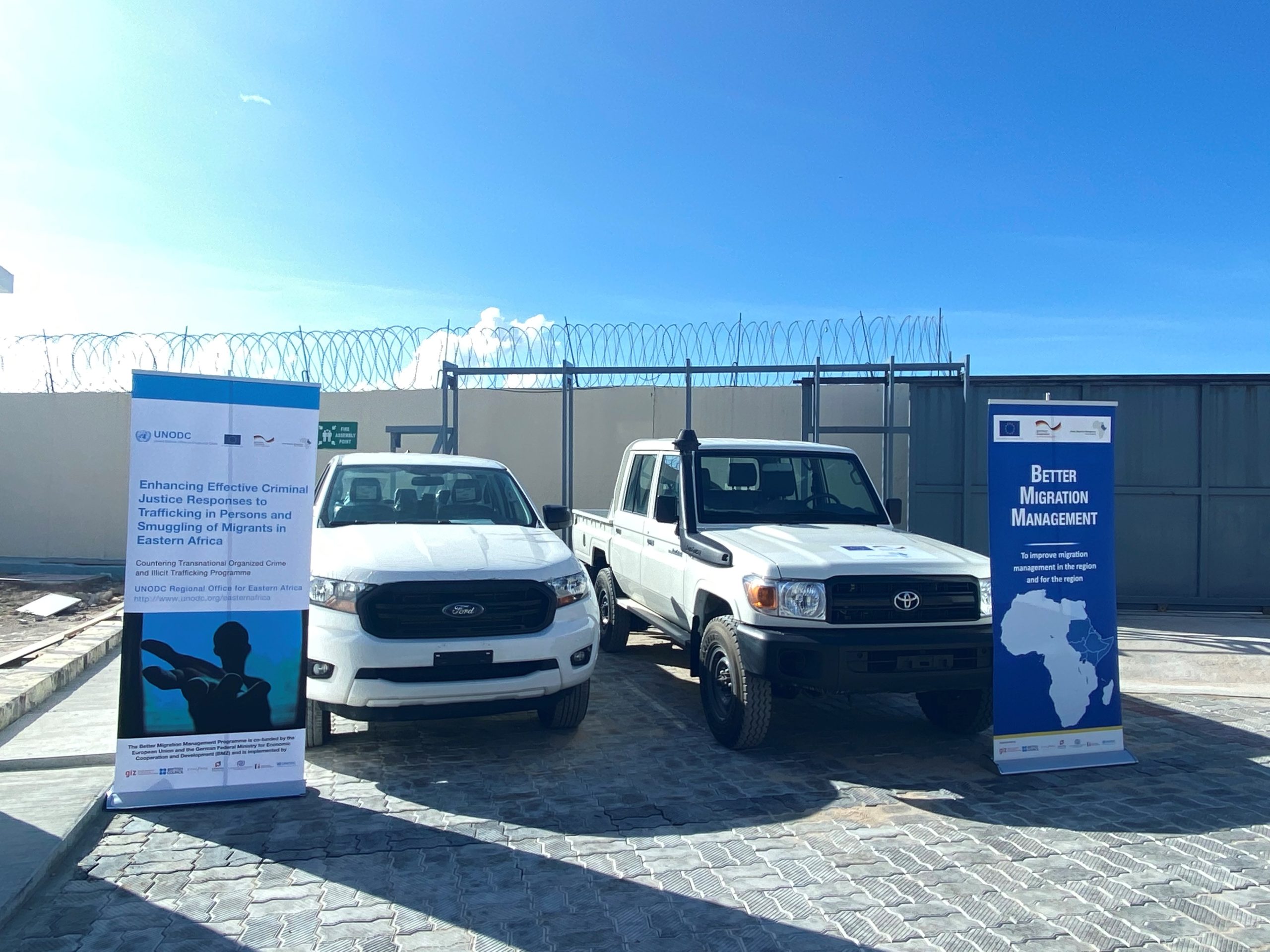
UNODC recently presented two vehicles and other equipment, including smartphones and office equipment, to the anti-Trafficking in Persons Unit of the Somali Police Force (SPF) Criminal Investigation Department (CID) in Mogadishu, during a ceremony at Chelsea Village Hotel, Mogadishu.
The vehicles and equipment will be used to strengthen the Unit’s operational capacity to counter Trafficking in Persons (TIP) and Smuggling of Migrants (SOM).
Every year, tens of thousands of migrants and refugees make the hazardous journey from south-central Somalia, Ethiopia and Yemen through the north-eastern region of Somalia and across the Gulf of Aden for economic and safety-related reasons. Many of these individuals end up becoming victims of trafficking, or being violated by smuggling syndicates on the migration routes.
With smuggling of migrants syndicates as well as illicit trafficking groups operating across borders, UNODC continues to emphasize the importance of Member States strengthening their national legal frameworks to criminalize TIP and SOM so as to prosecute and prevent trafficking and smuggling, but also to ensure protection and support of victims of trafficking and vulnerable migrants. Moreover, Member States must also strengthen their capacity and knowledge to enhance cooperation across borders.
Speaking at the handover ceremony, SPF Deputy Police Commissioner, Brigadier Genl. Osman Abdullahi Mohamed Kaniif acknowledged and thanked UNODC for the effective cooperation with the SPF across projects. He also thanked UNODC and the donors for their continuous support to Somalia.
The Ambassador of the European Union to Somalia, H. E. Mr. Nicolás Berlanga Martínez, commented on the severity of the challenges of TIP: “For any country to be able to successfully address and prevent trafficking and smuggling of human beings, it needs to have a well-equipped and law enforcement with the required expertise. Trafficking and smuggling of human beings are transboundary issues. Addressing them therefore requires international cooperation and a joint response. It is estimated that human trafficking is a $150 billion industry and one of the fastest-growing transnational criminal activities of our times. This type of exploitation is causing immense suffering for its victims, out of which a majority are women and girls, and we owe it to them to do our best to stop such heinous crimes”.
In turn, Mr. Johan Kruger, Head of Transnational Organized Crime, Illicit Trafficking and Terrorism Programmes for UNODC Eastern Africa, remarked that the handover was merely a start of UNODC’s assistance to the SPF: “Our intention is to fully align and enhance our support to specialized units at the Federal and Federal Member States level as part of both the Better Migration Management (BMM) programme and the Criminal Investigation Programme (CIP) for Somalia to ensure maximum operational functionality. It is of critical importance for us to ensure that these units are fully operational and able to cooperate with counterparts from across the region.”
The two four-wheel drive vehicles and other equipment were procured by UNODC as part of the Better Migration Management (BMM) Programme, funded by the European Union (EU) Emergency Trust Fund for Africa (EUTF) and the German Federal Ministry for Economic Cooperation and Development (BMZ). The BMM Programme is being implemented by UNODC as part of its regional Countering Transnational Organized Crime and Illicit Trafficking Programme within the framework of the UNODC Regional Programme for Eastern Africa (2016-2021) – Promoting the Rule of Law and Human Security in Eastern Africa.
The handover of the vehicles and equipment to Somalia marked the end of Phase 1 (2016-2019) of the BMM programme in Somalia, which will be complete after two additional vehicles have been handed over to the CID in Baidoa and Garowe. UNODC will also be handing over equipment to the Ethiopia Federal Police Commission in Addis Ababa, and to the Kenya National Police Service’s Directorate for Criminal Investigation (DCI) in Nairobi, Kenya between November and December.